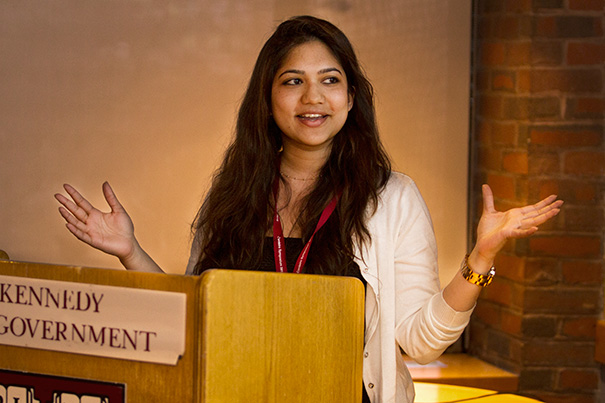
The Cordeiro Family Undergraduate Research Fellowship for Global Health and Health Policy has funded undergraduate research projects for more than 100 students. At a recent gathering of fellows, Ishani Premaratne (photo 1) described her study of the way women in Chiapas, Mexico, perceive health care and its value. Aubrey Walker (photo 2) focused his research project on health reform at a prison in Colombia. During an informal discussion, Christina Nguyen (left, photo 3) and Annika Nielsen discussed their research projects with other Cordeiro fellows.
Photos by Kiera Blessing
A decade of student impact
Cordeiro family fellowship supports undergraduate research
Health care reform in Colombian prisons. Community nutrition in Dorchester, Massachusetts. FDA approval of new drug therapies. These are just some of the research areas undergraduates have investigated with the support of the Cordeiro Family Undergraduate Research Fellowship for Global Health and Health Policy.
Now in its 10th year, the fellowship has funded undergraduate research projects for more than 100 students. The most recent cohort, all with secondary concentrations in global health and health policy, shared highlights from their senior theses with members of the Cordeiro family at a celebratory program held March 27. Many plan to go to medical school after they graduate, and three — Vivian Chan ’15, Aubrey Walker ’15, and Michelle Lee ’15 — were awarded Fulbright grants to continue their research.
The fellowship program was recently endowed by the Cordeiros — Carlos Cordeiro ’78, M.B.A. ’80; Peter Cordeiro ’79, M.D. ’83; Eduardo Cordeiro ’89, M.B.A. ’94; and Patricia Cordeiro-Seth ’81 — to support future generations of global health and health-policy scholars.
“We wouldn’t have been able to attend Harvard without financial aid,” said Eduardo, who noted that he and his siblings were searching for ways to stay connected to a place that had been so influential in their lives. “We wanted to give back by supporting undergraduates and their research.”
Looking at prison reform
“The Cordeiro Fellowship allowed me to pursue my research — it is another example of the kind of transformative experiences that Harvard is able to provide,” said Walker, who also received a David Rockefeller International Experience Grant.
Walker traveled to Colombia with research adviser and Harvard graduate student Julián Urrutia to conduct a health-needs assessment in a men’s prison.
“We wanted to take a snapshot of the kind of health issues prisoners were experiencing,” said Walker, who has long been interested in the impact of racial and ethnic disparities in access to health care.
Ultimately, he wants to help improve the delivery of health care in correctional systems. Now with a Fulbright, he will return to Colombia after graduation to work with Urrutia to improve the quality of care in the country’s prisons.
How does an urban community feed itself?
Annika Nielsen ’15 spent her summer investigating how residents in urban areas of Dorchester purchased food. She found that it wasn’t always convenience that influenced their shopping habits and nutritional choices. “Residents don’t go to the nearest supermarket or neighborhood store,” she said. “They would rather go to the store that has the best prices, even if it means a lot of travel. They tend to value price over proximity.”
Nielsen was able to use the fellowship funds to interview residents, pay transportation costs, and buy items in local stores while conducting research. “It was a wonderful experience to investigate these issues in the neighborhood where I grew up,” she said.
After graduation, Nielsen said she plans to work with a local start-up that focuses on community nutrition plans. She is excited about helping to create a cooking-class curriculum and working with residents on healthy eating. “This experience gave me a lot of insight into community health and how we might be able to alleviate health disparities through education,” she said. “I can’t wait to do more.”
FDA approval of new drug therapies
With the help of the fellowship, Audrey Zhang ’15 was able to work alongside clinicians at Brigham and Women’s Hospital on her independent project: an examination of how the U.S. Food and Drug Administration (FDA) evaluates the efficacy and safety of new drugs.
“It was such an interdisciplinary and collaborative environment,” said Zhang. “I was able to look at how we approach medical innovation historically, alongside people who are doing legal research and outcomes research that will impact health policies.”
Zhang said she can’t wait to continue her examination of pharmaceutical policy at medical school in the fall. “There are so many aspects that I’d like to continue to research,” she said. “I’m really excited.”
Having a real impact
The Cordeiro family returns to campus every year to hear these student presentations. “What these students are achieving is just remarkable,” said Eduardo Cordeiro. “We feel so fortunate to continue to be engaged with such a high-quality program.”
The fellowship celebration also included the Cordeiro Symposium (March 28), attracting more than 50 former fellowship recipients and leading health experts, including Richard Frank, assistant secretary for planning and evaluation, U.S. Department of Health and Human Services; Gary Gottlieb, CEO, Partners In Health; David Blumenthal, president and CEO, The Commonwealth Fund; Sandra Lynne Fryhofer ’12, director of delivery system reform in the Office of Health Reform, U.S. Department of Health and Human Services; David Cutler, Otto Eckstein Professor of Applied Economics; and Joseph Newhouse, John D. MacArthur Professor of Health Policy and Management.
“My siblings and I really wanted to stay connected with Harvard,” said Eduardo Cordeiro. “We think these fellowship recipients are having a real impact and are our future leaders.”




